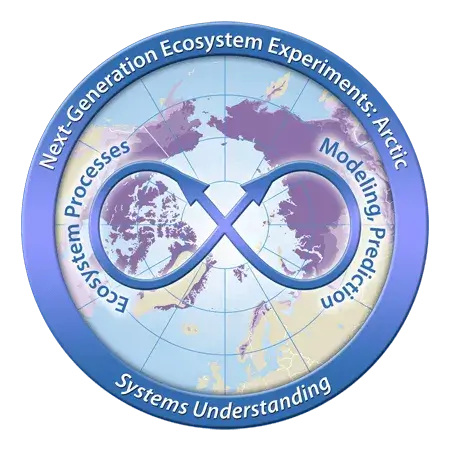Burnett, Angela C., et al. “The ‘one‐point method’ for Estimating Maximum Carboxylation Capacity of Photosynthesis: A Cautionary Tale”. Plant, Cell & Environment, vol. 42, no. 8, 2019, pp. 2472-81, https://doi.org/10.1111/pce.13574.
Publications
Displaying 41 - 60 of 79
By year of publication, then alphabetical by title
- Thomas, H. J. D., et al. “Traditional Plant Functional Groups Explain Variation in Economic But Not size‐related Traits across the Tundra Biome”. Global Ecology and Biogeography, vol. 28, no. 2, 2019, pp. 78-95, https://doi.org/10.1111/geb.12783.
- Reuss-Schmidt, Kassandra, et al. “Understanding Spatial Variability of Methane Fluxes in Arctic Wetlands through Footprint Modelling”. Environmental Research Letters, vol. 14, no. 12, 2019, p. 125010, https://doi.org/10.1088/1748-9326/ab4d32.
- Bennett, Katrina E., et al. “Using MODIS Estimates of Fractional Snow Cover Area to Improve Streamflow Forecasts in Interior Alaska”. Hydrology and Earth System Sciences, vol. 23, no. 5, 2019, pp. 2439-5, https://doi.org/10.5194/hess-23-2439-2019.
- Ghimire, Bardan, et al. “A Global Trait-Based Approach to Estimate Leaf Nitrogen Functional Allocation from Observations”. Ecological Applications, vol. 27, no. 5, 2017, pp. 1421-34, https://doi.org/10.1002/eap.1542.
- Zhu, Qing, et al. “A New Theory of Plant-Microbe Nutrient Competition Resolves Inconsistencies Between Observations and Model Predictions”. Ecological Applications, vol. 27, no. 3, 2017, pp. 875-86, https://doi.org/10.1002/eap.1490.
- Rogers, Alistair, et al. “A Roadmap for Improving the Representation of Photosynthesis in Earth System Models”. New Phytologist, vol. 213, no. 1, 2017, pp. 22-42, https://doi.org/10.1111/nph.14283.
- Lewin, Keith F., et al. “A Zero-Power Warming Chamber for Investigating Plant Responses to Rising Temperature”. Biogeosciences, vol. 14, no. 18, 2017, pp. 4071-83, https://doi.org/10.5194/bg-14-4071-2017.
- Dou, Shan, et al. “An Effective-Medium Model for P-Wave Velocities of Saturated, Unconsolidated Saline Permafrost”. GEOPHYSICS, vol. 82, no. 3, 2017, https://doi.org/10.1190/geo2016-0474.1.
- Nicolsky, Dmitry J., et al. “Applicability of the Ecosystem Type Approach to Model Permafrost Dynamics across the Alaska North Slope”. Journal of Geophysical Research: Earth Surface, vol. 122, no. 1, 2017, pp. 50-75, https://doi.org/10.1002/2016JF003852.
- Dafflon, Baptiste, et al. “Coincident Aboveground and Belowground Autonomous Monitoring to Quantify Covariability in Permafrost, Soil, and Vegetation Properties in Arctic Tundra”. Journal of Geophysical Research: Biogeosciences, vol. 122, no. 6, 2017, pp. 1321-42, https://doi.org/10.1002/2016JG003724.
- Wang, Kang, et al. “Continuously Amplified Warming in the Alaskan Arctic: Implications for Estimating Global Warming Hiatus”. Geophysical Research Letters, vol. 44, no. 17, 2017, pp. 9029-38, https://doi.org/10.1002/2017GL074232.
- Langford, Zachary L., et al. “Convolutional Neural Network Approach for Mapping Arctic Vegetation Using Multi-Sensor Remote Sensing Fusion”. 2017 IEEE International Conference on Data Mining Workshops (ICDMW)2017 IEEE International Conference on Data Mining Workshops (ICDMW), IEEE, 2017, https://doi.org/10.1109/ICDMW.2017.48.
- Tran, Anh Phuong, et al. “Coupled Land Surface-Subsurface Hydrogeophysical Inverse Modeling to Estimate Soil Organic Content and Explore Associated Hydrological and Thermal Dynamics in an Arctic Tundra”. The Cryosphere, vol. 11, 2017, pp. 2089-0, https://doi.org/10.5194/tc-11-2089-2017.
- Strauss, Jens, et al. “Deep Yedoma Permafrost: A Synthesis of Depositional Characteristics and Carbon Vulnerability”. Earth-Science Reviews, vol. 172, 2017, pp. 75-86, https://doi.org/10.1016/j.earscirev.2017.07.007.
- Wu, Yuxin, et al. “Electrical and Seismic Response of Saline Permafrost Soil During Freeze - Thaw Transition”. Journal of Applied Geophysics, vol. 146, 2017, pp. 16-26, https://doi.org/10.1016/j.jappgeo.2017.08.008.
- Raz-Yaseef, Naama, et al. “Evapotranspiration across Plant Types and Geomorphological Units in Polygonal Arctic Tundra”. Journal of Hydrology, vol. 553, 2017, pp. 816-25, https://doi.org/10.1016/j.jhydrol.2017.08.036.
- Xu, Xiaofeng, et al. “Global Pattern and Controls of Soil Microbial Metabolic Quotient”. Ecological Monographs, vol. 87, no. 3, 2017, pp. 429-41, https://doi.org/10.1002/ecm.1258.
- Herndon, Elizabeth M., et al. “Influence of Iron Redox Cycling on Organo-Mineral Associations in Arctic Tundra Soil”. Geochimica Et Cosmochimica Acta, vol. 207, 2017, pp. 210-31, https://doi.org/10.1016/j.gca.2017.02.034.
- Raz-Yaseef, Naama, et al. “Large Carbon Dioxide and Methane Emissions from Polygonal Tundra During Spring Thaw in Northern Alaska”. Geophysical Research Letters, vol. 44, no. 1, 2017, pp. 504-13, https://doi.org/10.1002/2016GL071220.

